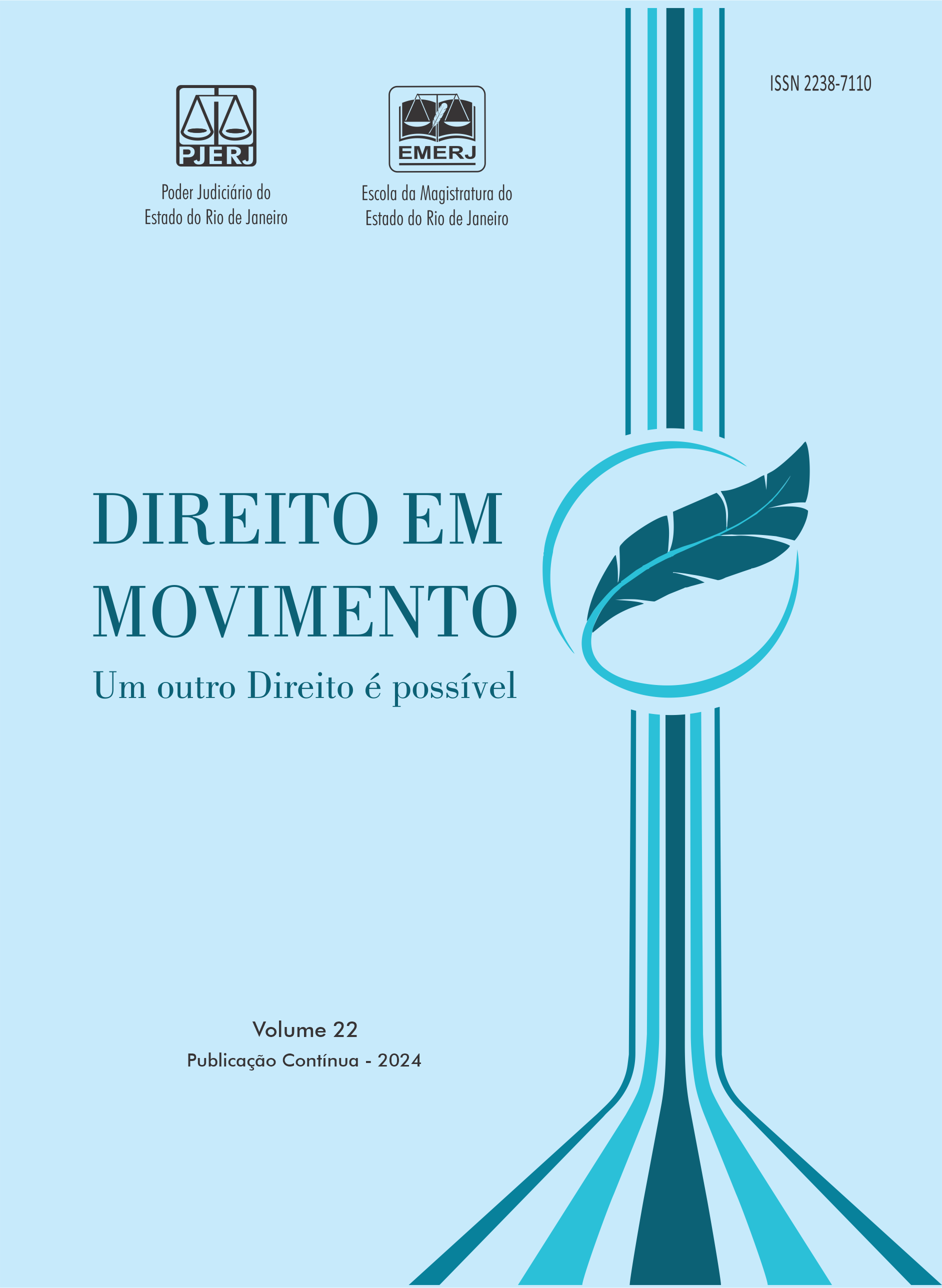Confluences between civil responsibility and personality rights in the digital age
Keywords:
Personality rights, Deep fake, Hate speech, Revenge porn, Reimbursement tutelageAbstract
The digital era and all the technological advances related to it provide society with a variety of facilities, especially with regard to communication, among countless other qualities. On the other hand, associated with the moral and ethical conditions of post-modernity, the global computer network presents some digital phenomena that represent serious risks to the protection of personality rights, especially honor, image, privacy and intimacy. Episodes involving deepfake, hate speech, revenge porn, shitstorm represent extremely damaging figures to aspects of the personality, which, once committed, can hardly be repaired. Although national legislation has evolved towards electing mechanisms and tools for the protection of these rights, as well as regulating the virtual environment in a relevant way, the challenges surrounding the protection of personality rights in the digital world still appear to be enormous. This research will use the deductive method and, as the main methodological procedure, bibliographical research. The aim is to investigate contemporary digital phenomena that are harmful to personality rights, as well as to understand whether compensatory protection is a sufficient tool for repairing damage to said rights.
References
ANDRADE, Daniel de Paula. Tutela específica das obrigações contratuais. Coimbra: Almedina, 2022
ARAÚJO, Janaina. Dez anos da Lei Carolina Dieckmann: a primeira a punir crimes cibernéticos. Senado Notícias, Brasília, DF, 29 mar. 2023. Disponível em: https://www12.senado.leg.br/noticias/audios/2023/03/dez-anos-da-lei-carolina-dieckmann-a-primeira-a-punir-crimes-ciberneticos. Acesso em: 15 jun. 2023.
BARLOW, John Perry. Declaração de Independência do Ciberespaço. DHnet, [s.l.], 1996. Disponível em: http://www.dhnet.org.br/ciber/textos/barlow.htm. Acesso em: 15 jun. 2023.
BIOLCATI, Fernando Henrique de O. Internet, fake news e responsabilidade civil das redes sociais. Coimbra: Almedina, 2022.
BITTAR, Carlos Alberto. Os direitos da personalidade. 8. ed. rev., aum. e mod. por Eduardo C. B. Bittar. São Paulo: Saraiva, 2015.
BOTELHO, Thais Helena Falcão; NOTH, Winfried. Deepfake: inteligência artificial para discriminação e geração de conteúdos. TECCOGS - Revista Digital de Tecnologias Cognitivas, [s.l.], n. 23, jan./jun. 2021, p. 69-78, 2021. Disponível em: https://revistas.pucsp.br/index.php/teccogs/article/view/55979/37927. Acesso em: 15 jun. 2023.
CASTELLS, Manuel. A galáxia da internet: reflexões sobre a internet, os negócios e a sociedade. Tradução: Maria Luiza X. de A. Borges. Rio de Janeiro: Jorge Zahar, 2003.
FACHIN, Zulmar. Desafios da regulação do ciberespaço e a proteção dos direitos da personalidade. Revista Jurídica (FURB), Blumenau, v. 25, n. 56, p.1-18, jan./abr. 2021. Disponível em: https://bu.furb.br/ojs/index.php/juridica/article/view/10081#:~:text=Resumo,prote%C3%A7%C3%A3o%20dos%20direitos%20da%20personalidade. Acesso em: 14 jun. 2023.
HAMMAN, Renan. Dono de site de Revenge Porn é condenado a 18 anos de prisão. Jusbrasil, [s.l.], 2015. Disponível em: https://www.jusbrasil.com.br/noticias/dono-de-site-de-revenge-porn-e-condenado-a-18-anos-de-prisao/179011387. Acesso em: 14 jun. 2023.
HAN, Byung-Chul. Psicopolítica: o neoliberalismo e as novas técnicas de poder. Tradução: Maurício Liesen. Belo Horizonte: Âyiné, 2020.
HAN, Byung-Chul. No enxame: perspectiva do digital. Tradução: Lucas Machado. Petrópolis: Vozes, 2018.
HARTMANN, Ivar A. Regulação da Internet e novos desafios da proteção de direitos constitucionais: o caso do revenge porn. RIL Brasília. a. 55, n. 219, p. 13-26, jul./set. 2018. Disponível em: https://www12.senado.leg.br/ril/edicoes/55/219/ril_v55_n219_p13.pdf. Acesso em: 15 jun. 2023.
PANNAIN, Camila Nunes; PEZZELLA, Maria Cristina Cereser. Liberdade de expressão e hate speech na sociedade da informação. Revista Direitos Emergentes na Sociedade Global, Santa Maria, v. 4, n. 1, p. 72-87, 2015. Disponível em: https://periodicos.ufsm.br/REDESG/article/view/19432/pdf. Acesso em: 15 jun. 2023.
PEREIRA, Luiz Ismael; CALDAS, Camilo Onoda Luiz. O fenômeno shitstorm: internet, intolerância e violação de direitos humanos. Interfaces Científicas - Humanas e Sociais. Aracaju, v. 6, n. 1, p. 123-134, jun. 2017. Disponível em: https://periodicos.set.edu.br/humanas/article/view/3540/2314. Acesso em: 14 jun. 2023.
SCHREIBER, Anderson. Direitos da personalidade. 2. ed. São Paulo: Atlas, 2013.
SPADONI, Joaquim Felipe. Ação inibitória: a ação preventiva prevista no art. 461 do CPC. São Paulo: Revista dos Tribunais, 2002.
THEODORO JUNIOR, Humberto. Dano Moral. 8. ed. São Paulo: Grupo GEN, 2016.
WAKEFIELD, Jane. Guerra na Ucrânia: os “presidentes deepfake’” usados na propaganda do conflito. BBC, [s.l.], 18 mar.2022. Disponível em: https://www.bbc.com/portuguese/internacional-60791955. Acesso em: 15 jun. 2023.
Downloads
Published
How to Cite
Issue
Section
License
Copyright (c) 2024 Hugo Leonardo Lippi Areas, Marcus Geandré Nakano Ramiro

This work is licensed under a Creative Commons Attribution 4.0 International License.
Authors who publish in this Journal agree to the following terms:
- Authors retain copyright and grant the Journal of Constitutional Research the right of first publication with the article simultaneously licensed under the Creative Commons - Attribution 4.0 International which allows sharing the work with recognition of the authors and its initial publication in this Journal.
- Authors are able to take on additional contracts separately, for non-exclusive distribution of the version of the paper published in this Journal (eg.: publishing in institutional repository or as a book), with a recognition of its initial publication in this Journal.
- Authors are allowed and encouraged to publish their work online (eg.: in institutional repositories or on their personal website) at any point before or during the submission process, as it can lead to productive exchanges, as well as increase the impact and the citation of the published work (see the Effect of Open Access).

















